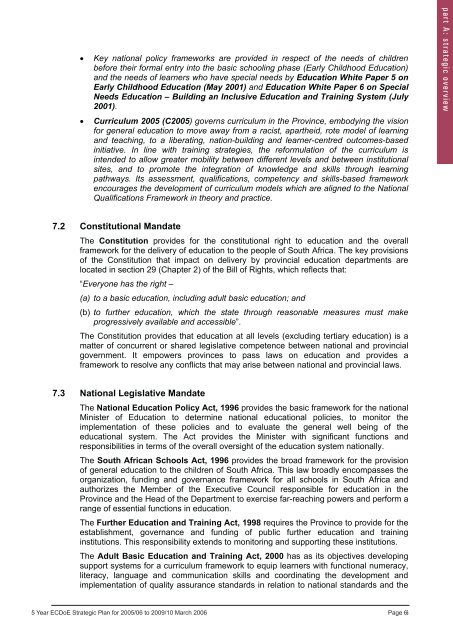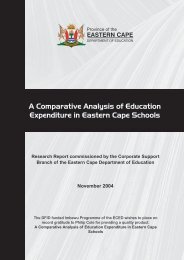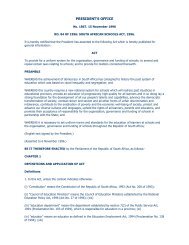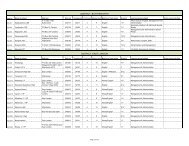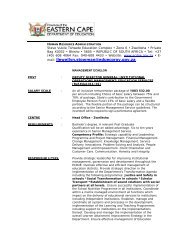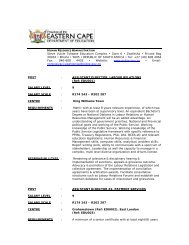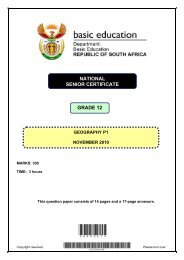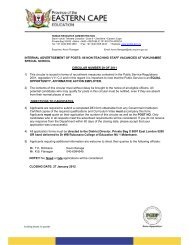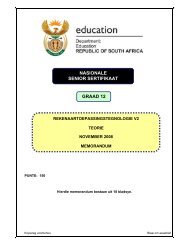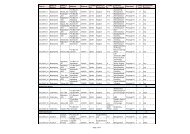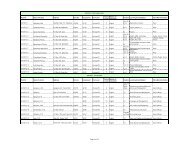part a: strategic overview - Department of Education
part a: strategic overview - Department of Education
part a: strategic overview - Department of Education
You also want an ePaper? Increase the reach of your titles
YUMPU automatically turns print PDFs into web optimized ePapers that Google loves.
� Key national policy frameworks are provided in respect <strong>of</strong> the needs <strong>of</strong> children<br />
before their formal entry into the basic schooling phase (Early Childhood <strong>Education</strong>)<br />
and the needs <strong>of</strong> learners who have special needs by <strong>Education</strong> White Paper 5 on<br />
Early Childhood <strong>Education</strong> (May 2001) and <strong>Education</strong> White Paper 6 on Special<br />
Needs <strong>Education</strong> – Building an Inclusive <strong>Education</strong> and Training System (July<br />
2001).<br />
� Curriculum 2005 (C2005) governs curriculum in the Province, embodying the vision<br />
for general education to move away from a racist, a<strong>part</strong>heid, rote model <strong>of</strong> learning<br />
and teaching, to a liberating, nation-building and learner-centred outcomes-based<br />
initiative. In line with training strategies, the reformulation <strong>of</strong> the curriculum is<br />
intended to allow greater mobility between different levels and between institutional<br />
sites, and to promote the integration <strong>of</strong> knowledge and skills through learning<br />
pathways. Its assessment, qualifications, competency and skills-based framework<br />
encourages the development <strong>of</strong> curriculum models which are aligned to the National<br />
Qualifications Framework in theory and practice.<br />
7.2 Constitutional Mandate<br />
The Constitution provides for the constitutional right to education and the overall<br />
framework for the delivery <strong>of</strong> education to the people <strong>of</strong> South Africa. The key provisions<br />
<strong>of</strong> the Constitution that impact on delivery by provincial education de<strong>part</strong>ments are<br />
located in section 29 (Chapter 2) <strong>of</strong> the Bill <strong>of</strong> Rights, which reflects that:<br />
“Everyone has the right –<br />
(a) to a basic education, including adult basic education; and<br />
(b) to further education, which the state through reasonable measures must make<br />
progressively available and accessible”.<br />
The Constitution provides that education at all levels (excluding tertiary education) is a<br />
matter <strong>of</strong> concurrent or shared legislative competence between national and provincial<br />
government. It empowers provinces to pass laws on education and provides a<br />
framework to resolve any conflicts that may arise between national and provincial laws.<br />
7.3 National Legislative Mandate<br />
The National <strong>Education</strong> Policy Act, 1996 provides the basic framework for the national<br />
Minister <strong>of</strong> <strong>Education</strong> to determine national educational policies, to monitor the<br />
implementation <strong>of</strong> these policies and to evaluate the general well being <strong>of</strong> the<br />
educational system. The Act provides the Minister with significant functions and<br />
responsibilities in terms <strong>of</strong> the overall oversight <strong>of</strong> the education system nationally.<br />
The South African Schools Act, 1996 provides the broad framework for the provision<br />
<strong>of</strong> general education to the children <strong>of</strong> South Africa. This law broadly encompasses the<br />
organization, funding and governance framework for all schools in South Africa and<br />
authorizes the Member <strong>of</strong> the Executive Council responsible for education in the<br />
Province and the Head <strong>of</strong> the De<strong>part</strong>ment to exercise far-reaching powers and perform a<br />
range <strong>of</strong> essential functions in education.<br />
The Further <strong>Education</strong> and Training Act, 1998 requires the Province to provide for the<br />
establishment, governance and funding <strong>of</strong> public further education and training<br />
institutions. This responsibility extends to monitoring and supporting these institutions.<br />
The Adult Basic <strong>Education</strong> and Training Act, 2000 has as its objectives developing<br />
support systems for a curriculum framework to equip learners with functional numeracy,<br />
literacy, language and communication skills and coordinating the development and<br />
implementation <strong>of</strong> quality assurance standards in relation to national standards and the<br />
5 Year ECDoE 5 Year ECDoE Strategic Strategic Plan for Plan 2005/06 for 2005-06 to 2009/10 to 2009-10. March 2006 21 F (6).doc Page 6<br />
contents <strong>part</strong> A: <strong>strategic</strong> <strong>overview</strong>


